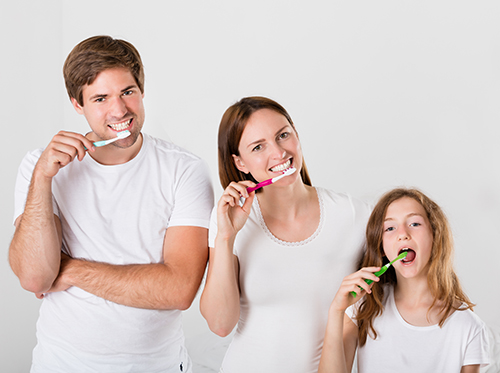January 25th, 2023

Depending on how long the thumb sucking or constant pacifier use continues, and how aggressively the child sucks a thumb or the pacifier, it can indeed be an oral health issue. Generally speaking, most children outgrow these behaviors or are able to be weaned off them successfully sometime between ages two and four. When children wean off the behaviors in this age range, long-term damage is unlikely.
Why Kids Suck Their Thumb or Pacifier
Both of these habits are actually a form of self soothing that your child likely uses when he or she is very upset, or feeling stressed, confused, frustrated, or unable to properly express the emotions. If your son or daughters is a regular thumb sucker, or the child wants to use the pacifier almost constantly, it is best to try to taper off these habits at a young age.
If your child continues to suck a thumb or request a pacifier consistently after leaving toddler-hood, this could be a source of concern, and it should be addressed with Dr. Jennifer Lo and Dr. Jacqueline Nguyen and our staff. We will be able to evaluate your child's mouth to look for any signs of damage such as palate changes or teeth shifting.
Say Goodbye to Old Habits
In the event that your child is quite reluctant to give up a pacifier or thumb-sucking habit, there are a few things you can do to discourage these behaviors.
- When you notice that your child is not using a pacifier or sucking a thumb, offer effusive praise. This type of positive reinforcement can be much more effective than scolding the child.
- Consider instituting a reward system for giving up the habit. If the child goes a certain amount of time without this behavior, award him or her for being such a “big kid.”
- Employ the help of older siblings or relatives that your child admires. When a child’s role model says that he or she stopped sucking thumbs at a certain age, your child is likely to try to emulate that.
January 18th, 2023

Two studies – one conducted in Washington State, and whose findings were published in the Journal of Pediatric Dentistry in 2004, and another conducted in Madrid, Spain, and whose findings were reported in 2012 in Science Daily, reinforce earlier findings that show a direct relationship between parental dental fear and that of their children.
The Washington study looked at dental fear among 421 children whose ages ranged from 0.8 to 12.8 years. The children were all patients at 21 different private pediatric dental practices in Western Washington State. The Spanish study looked at 183 children between the ages of seven and 12, and their parents in Madrid.
The Washington study used the Dental Sub-scale of the Child Fear Survey Schedule. The survey responses came from either parents, or other parties charged with taking care of the children. The people responsible for each child filled out the survey, which consisted of 15 questions to which answers were given based on the child’s level of fear. The scale used was one to five, with one meaning the child wasn’t afraid at all, and five indicating the child was terrified. The maximum possible points (based on the greatest fear) was 75.
Spanish researchers found that like past studies, there is a direct connection between parental dental fear levels and those of their kids. The most important new discovery from the study conducted in Madrid, was that the more anxiety and fear a father has of going to the dentist, the higher the fear levels among the other family members.
Parents, but especially fathers, who suffer from fear of going to the dentist and fear of dental procedures in general pass those fears on to every member of the family. While parents may not feel like they have control over those fears, the best way to help your child understand the importance of going to the dentist is by not expressing your fears in front of them – or around the rest of the family.
Dr. Jennifer Lo and Dr. Jacqueline Nguyen and our team understand that some patients are more fearful than others when it comes to visitingour Salinas office. We work hard to make our practice as comfortable for our patients, both children and adults.
January 18th, 2023

Childhood tooth decay is the most common chronic childhood disease, affecting nearly one in three children between the ages of two and five. In fact, the American Academy of Pediatric Dentistry reports that tooth decay can appear in children as young as six months old. As a parent, it is possible to spare your child from early childhood tooth decay, and potentially prevent a lifetime of oral health problems in one fell swoop.
Birth to age two
Good oral health begins before your child’s teeth ever erupt from the gums. During the first few months of life, you should be wiping your child’s gums with a damp cloth after eating. As soon as teeth appear, Dr. Jennifer Lo and Dr. Jacqueline Nguyen and our team at Little Bristles recommend you start brushing them with a toddler toothbrush and water, and call our Salinas office to schedule your child’s first visit. Never allow your child to go to bed with a bottle, and try to limit beverages other than water only to meal times. Children who walk around or go to sleep with bottles or sippy cups full of juice or milk are exposed to more sugars and are more likely to develop tooth decay.
Ages two to six
All of your child’s primary teeth should erupt by age three. Brush your toddler’s teeth at least twice daily with a toddler toothpaste and toothbrush. As your child gets older and learns not to swallow toothpaste, you may begin to use oral care products specially designed for preschoolers and elementary-age children. Be sure to maintain regular dental appointments and cleanings as recommended by your child’s dentist, and encourage your son or daughter to begin drinking from a regular cup. This is also the time to teach your child the importance of healthy eating habits, which includes limiting sweets and sugary desserts to mealtime.
By first grade, your child will begin to lose primary teeth. This is the time to start talking with Dr. Jennifer Lo and Dr. Jacqueline Nguyen about dental sealants, which can prevent tooth decay from forming on the chewing surfaces of the teeth. Sealants are painless, easy to apply, and undetectable to other people.
Tips
Fluoride is an important ingredient for healthy teeth. Check to make sure the water your child drinks is enriched with fluoride. Also, brush your child’s teeth with fluoridated toothpaste, and talk to our office about whether fluoride treatments could be right for your family. For more information about preventing your child’s tooth decay, or to schedule an appointment with Dr. Jennifer Lo and Dr. Jacqueline Nguyen, please give us a call at our convenient Salinas office!
January 11th, 2023

It’s gratifying to know your child has good oral hygiene, especially starting from an early age. We know it can be difficult to get your son or daughter to brush those tiny teeth, let alone brush them well enough, every day. Dr. Jennifer Lo and Dr. Jacqueline Nguyen and our team are here to give you some tips on how to help your youngster learn excellent oral health habits.
Your child should brush his or her teeth at least twice a day in order to prevent cavities and decay. An grownup may have to assist with flossing or using mouthwash. Always make sure your little one doesn’t swallow toothpaste or mouthwash in the process.
Only buy alcohol-free mouthwash, especially if you have young children in your household. Oral healthcare should be made fun from the start, to create good habits!
Helpful Tips
- Set a good example. Brush your teeth with your children and make it fun! Pick a two-minute song to play while brushing and dance along to it.
- Make it a race to the bathroom to see who can get the toothbrush and floss out first.
- Use a sticker sheet. For every night your children brush well, give them a sticker. After they’ve earned certain number of stickers, they win a reward. Let them pick it!
- Let your child check your brushwork, or try letting your youngster brush your teeth!
- Allow children to play with a toothbrush if they want to. They can brush their favorite stuffed animal’s or doll’s teeth before bed as well.
- Let your child pick his or her own toothbrush or toothpaste from a range of options you provide. Kids might pick one with their favorite cartoon character(s) on it, for example.
- Get a two-minute brushing timer your child can flip over when he or she starts to brush. Your son or daughter can watch the sand fall until it’s empty, which notifies the kid it’s time to stop brushing.
- Buy special children’s mouthwash that is colored to stain the areas of the child’s mouth where he or she needs to re-brush for effectiveness.
- Be gentle when your little one makes a mistake like forgetting to brush, and remind your son or daughter about the importance of good oral health in a fun, loving way.
There are plenty of ways to make brushing your child’s teeth more fun and effective. When Dr. Jennifer Lo and Dr. Jacqueline Nguyen and the parents work together, we can help establish good oral health habits in children that will last a lifetime.
Take the trouble to set a great example for your children, and they will follow in your footsteps. If you’re concerned about your child’s oral health, contact our Salinas office and schedule an appointment with our team.





